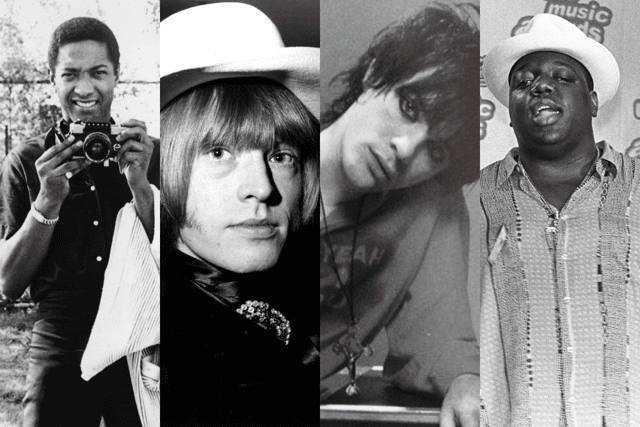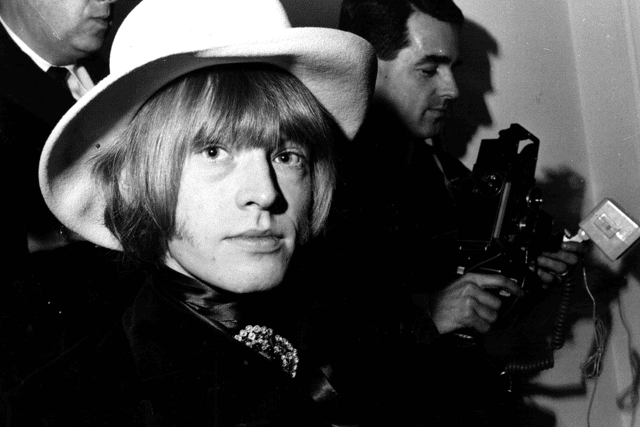What are some of music’s remaining unsolved mysteries, as Duane Davis charged over Tupac Shakur's murder?
This article contains affiliate links. We may earn a small commission on items purchased through this article, but that does not affect our editorial judgement.
and live on Freeview channel 276
After nearly three decades of questions, the family of the late Tupac Amaru Shakur might finally be given answers after the Las Vegas Police Department last night confirmed that they would be charging Duane ‘Keefe D’ Davis over the 1996 murder of the hip-hop artist. With it, fans alike might finally have some closure regarding one of music’s biggest unsolved mysteries.
During a press conference after the arrest, LVMPD officer Jason Johansson credited the force's commitment to the investigation, describing it as having "finally yielded results." He went on to outline the pivotal development that led to this breakthrough. According to Johansson, Orlando Anderson, the late nephew of the suspect, had engaged in a physical altercation with Shakur at a casino shortly before the rapper's shooting on September 7, 1996. Shakur succumbed to his injuries a few days later in the hospital.
Advertisement
Hide AdAdvertisement
Hide AdJohansson then presented hotel security camera footage to journalists, which depicted Anderson being assaulted. He explained that this incident ultimately triggered the retaliatory shooting of Shakur while he waited in his car at a red traffic light.
The officer further stated that it became readily apparent early on that this was a crime associated with gangs, and the case had undergone numerous reviews. However, it wasn't until 2018, when fresh information emerged, that the case gained a renewed sense of purpose. Johansson also made reference to Mr. Davis's public statements, where he openly admitted to being in the vehicle from which the shots were discharged.
While the family of Tupac Shakur can now understand a little more what happened the night of his death, the music industry still has some unsolved mysteries that have been mired in conspiracy theories and rumours, but ultimately have as of yet never been solved. Will any of these finally get the closure the families have been looking for since they occurred?
What are some of music’s remaining unsolved mysteries?
The Murder of Christopher Wallace (The Notorious B.I.G.)
We of course have to start with what many consider was a retaliatory murder against East Coast hip-hop artist Christopher Smalls aka The Notorious B.I.G. On March 9, 1997, The Notorious B.I.G met a tragic end in Los Angeles. He had attended a party but left around 12:30 a.m. in a Chevrolet Suburban, accompanied by his entourage.
Advertisement
Hide AdAdvertisement
Hide AdAs they waited at a red light, a dark-coloured Chevrolet Impala pulled up next to them. An unknown assailant inside the Impala fired four shots at Biggie's Suburban. While three bullets were non-fatal, one struck him in the hip and proved deadly, hitting vital organs. Despite being rushed to Cedars-Sinai Medical Center, he was pronounced dead at 1:15 a.m., at just 24 years old.
The investigation faced significant hurdles, including a perceived lack of cooperation from key figures in the music industry. Sean "Diddy" Combs, who was in the same vehicle as Biggie at the time of the shooting, was accused of failing to fully cooperate with authorities, leading to questions about his involvement.
Some theories suggested that gang affiliations might have played a role in the murder. The theory involving Marion "Suge" Knight, a known Bloods affiliate and co-founder of Death Row Records, conspiring with corrupt LAPD officers to kill Biggie was explored. The alleged hitman, Amir Muhammad, was reportedly tied to this conspiracy. However, concrete evidence remained elusive.
Manic Street Preacher’s Richey Edwards goes missing
On February 1, 1995, Richey Edwards, a member of the band Manic Street Preachers, disappeared on the day he was supposed to fly to the U.S. for a promotional tour. In the two weeks leading up to his disappearance, he withdrew a significant amount of money from his bank account, but it remains unclear how he intended to use it. The night before he vanished, he gave a friend a book that hinted at his state of mind, and he left a decorated package for his on-and-off girlfriend.
Advertisement
Hide AdAdvertisement
Hide AdEdwards collected his wallet, car keys, some medication, and his passport the next morning, checked out of his hotel in London, and drove to his flat in Cardiff. However, he left behind important items, including his passport and medication. In the following weeks, there were reported sightings of him, including one with a taxi driver and one at a service station. Later, his car received a parking ticket, and it was found abandoned with signs that he had been living in it.
Due to its proximity to a suicide site, it was believed that Edwards might have jumped from the Severn Bridge. Despite alleged sightings in various places, his disappearance remains a mystery. The investigation faced criticism, including concerns that his mental state wasn't adequately considered, and the case remained open as a missing person until November 23, 2008, when he was officially declared "presumed dead."
The murder of Sam Cooke


Sam Cooke was a celebrated soul singer and songwriter known for hits like ‘A Change Is Gonna Come’ and ‘Cupid.’ In 1964, Cooke was shot and killed under mysterious circumstances at a Los Angeles motel. He had been involved in an altercation with the motel's manager, Bertha Lee Franklin.
Many questions surround the case, including the manager's version of events, and whether Cooke's death was a result of self-defense, a setup, or a deeper conspiracy. The case remains unsolved, and conspiracy theories continue to circulate.
Advertisement
Hide AdAdvertisement
Hide AdSinger Etta James viewed Cooke's body before his funeral and questioned the accuracy of the official version of events. She wrote that the injuries she observed were well beyond the official account of Cooke having fought Franklin alone. James wrote that Cooke was so badly beaten that his head was nearly separated from his shoulders, his hands were broken and crushed, and his nose mangled.
Some have speculated that Cooke's manager, Allen Klein, had a role in his death. Klein owned Tracey Ltd, which ultimately owned all rights to Cooke's recordings. However, no concrete evidence supporting a criminal conspiracy has been presented
The Death of The Rolling Stones’ Brian Jones


Brian Jones, a founding member of the iconic rock band The Rolling Stones, was found dead in his swimming pool at his Sussex home in 1969. The coroner's report listed "death by misadventure," citing his drug and alcohol use.
However, suspicions and theories persist, suggesting foul play or a murder conspiracy involving individuals close to him. In August 2009, Sussex Police initiated a case review regarding Brian Jones' death, marking the first such review since 1969. This decision came in response to newly uncovered evidence presented by investigative journalist Scott Jones.
Advertisement
Hide AdAdvertisement
Hide AdScott Jones had traced many individuals who were present at Brian Jones' residence on the fateful night of his demise. Furthermore, he had unearthed previously undisclosed police records archived at the National Archives.
Upon completing the review in 2010, Sussex Police officially declared that the case would not be reopened. Their stance was firm, asserting that, "This matter underwent an exhaustive examination by Sussex Police's Crime Policy and Review Branch. Nevertheless, no fresh evidence has emerged to challenge the original coroner's verdict of 'death by misadventure.’”
Comment Guidelines
National World encourages reader discussion on our stories. User feedback, insights and back-and-forth exchanges add a rich layer of context to reporting. Please review our Community Guidelines before commenting.
